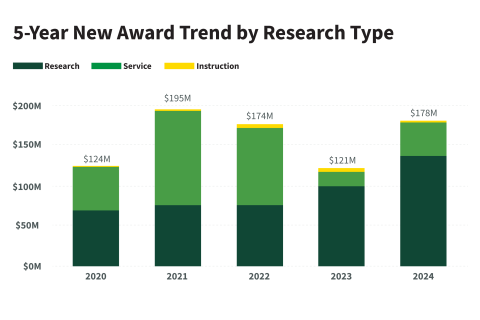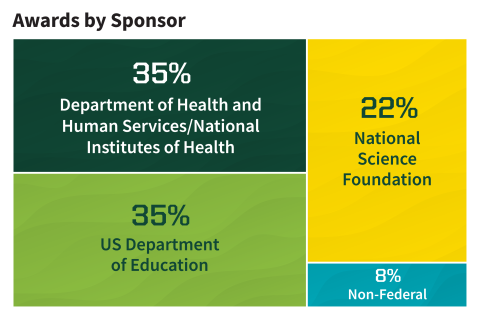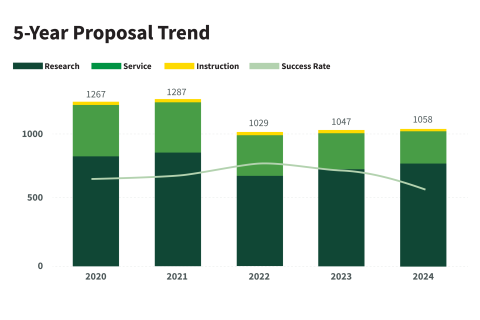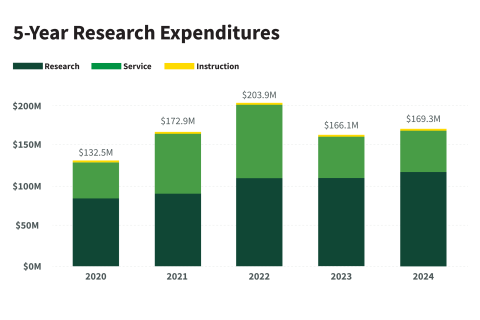
The University of Oregon’s research enterprise continued to grow in fiscal year 2023-24 (FY 24) across all disciplines to support scholarship and creative activity.
Sponsored project funding again increased, a key predictor of research growth with $178 million in new awards, a 47% increase from FY 23. Faculty submitted 1,082 proposals, 409 of which were funded.

Most funding (91%) came from federal sources. Approximately 35% of federal funds are from the Department of Education, another 35% are from the National Institutes of Health (NIH), 22% are from the National Science Foundation (NSF), and the remaining 8% are from other agencies. Seventy-seven percent of the awarded funds were for research projects, 2% for instruction, and the remaining 21% were designated for other uses, such as public service like the Early Childhood CARES program, which provides early intervention and early childhood special education services to more than 1,600 infants, toddlers and preschool children with developmental delays or disabilities in Lane County annually.
Research expenditures also increased $7 million over FY 23 to $116 million. In FY 24, the UO changed its methodology for reporting awards from totaling the actual amounts received from sponsors during the respective year to reporting the full amounts of projects committed by sponsors in the year it was received. However, the amount committed is not always the actual amount received, often due to adjustments in federal budget allocations.

“The UO achieved national recognition this past year for the caliber of faculty and student research directions, as well as the growth of important partnerships serving the region and nation,” said Anshuman “AR” Razdan, vice president for research and innovation. “We are seeing come to fruition the UO’s investment in and support of its faculty, students, and partners.”
Beyond these metrics, faculty at early- and mid-career levels received prestigious awards or were elected fellows of national research societies. It was also a year of building collaborations with other research institutions and external partners.
Major honors and awards
UO faculty continue to earn high-impact awards. In FY 2024, four faculty—Jennifer Ruef, Luca Mazzucato, Brittany Erickson, and Julia Widom—received NSF CAREER awards, one of the most prestigious grants early-career faculty can receive.
Neuroscientist Judith Eisen was elected to the National Academy of Science in recognition of her work on neuron development and how the enteric nervous system in the gut regulates and interacts with microbes in the intestine.

UO-affiliated Ted Fremd, who recently retired from his position as head paleontologist at the John Day Fossil Beds National Monument, was elected to the American Association for the Advancement of Science. Five fossil species have been named in Fremd’s honor.
Bioengineer Danielle Benoit was elected to the National Academy of Inventors, joining a growing group of member faculty. Benoit’s research has provided insights into the translation of tissue engineering strategies for bone healing and the development of tissue models to discover new drugs and drug delivery systems.
Camisha Russell, associate professor of philosophy, was named a Mellon Foundation New Directions Fellow. This is the first time a UO faculty member has received this award—only 12 scholars are selected nationally each year. The New Directions Fellow program recognizes scholars whose work will benefit scholarship in the humanities and include the highest standard in cross-disciplinary research, according to the organization.
Student success
Twelve students were named Hui Undergraduate Research Scholars. The HURS program supports students from backgrounds that have been historically marginalized in STEM by providing them with a $15,000 fellowship award and cohort-based professional development activities focused on science communication and career preparation.
Nineteen undergraduate students were awarded summer VPRI and O’Day research fellowships. The fellows were selected through a competitive review process that evaluated the applicant’s research idea, proposed methodology/approach, and investigator biography.
Funded by a nearly $2 million grant from the National Institutes of Health, the University of Oregon Program to Increase Resilience and Enhance Persistence in Biomedical Sciences (UO PREP Bio) will join a network of similar programs across the US aimed at helping promising scholars from historically excluded backgrounds make the transition into rigorous graduate programs. The program, led by Nadia Singh, associate professor of biology, offers transformative experiences for aspiring graduate researchers from minoritized backgrounds.
Institutional strengths
In addition to new awards, the UO received several renewals—a testament to the impact and effectiveness of an ongoing project.

Leslie Leve, the Lorry Lokey professor of Education in the Department of Counseling Psychology and Human Services in the College of Education and research scientist in the Prevention Science Institute, received an additional $3.5 million funding renewal from NIH for the longitudinal Environmental influences on Child Health Outcomes (ECHO) Program.
The national crisis of the downward trend of children’s mental health points to the urgent needs to understand the underlying factors. Itself part of a larger national effort involving more than 50,000 children, the UO’s study delves into answering the question of how the timing of exposure to specific environmental influences—for example a traumatic experience or exposure to pollutants—matter for specific health outcomes.
Also in the College of Education, Kent McIntosh, the Philip H. Knight Chair of Special Education in the UO’s College of Education, received more than $21 million in renewal funding from the US Department of Education to continue the longstanding mission of the Center on Positive Behavioral Interventions and Supports to assist schools in building positive and affirming learning environments.
Building partnerships
Finally, FY 24 was a year for building the foundations of successful collaborations. More than 100 scientists and community partners convened to discuss resilience and preparedness planning in a workshop hosted by the Cascadia Region Earthquake Science Center (CRESCENT), a new multi-institution earthquake research center led by the University of Oregon.
Finally, in June, staff from the University of Oregon’s Office of the Vice President for Research and Innovation and several faculty members met with representatives from Intel Corporation at the company’s Hillsboro, Oregon facility to discuss further opportunities for collaboration and workforce development.
Organized by Launch Oregon Board Trustee Bryan Wolf and Anshuman “AR” Razdan, vice president for research and innovation, the overarching goal of the meeting was to find additional ways to elevate the UO-Intel relationship and pave the road for UO’s growing involvement in the semiconductor industry in the region.
